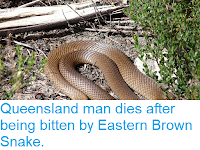A schoolgirl has died after being bitten by a Cobra in Tamil Nadu State, India, on Sunday 15 September 2019. The girl, identified as R Varsha, 14, was bitten by the Snake while sleeping in a hostel attached to a government-aided school in the city of Dindigul. She alerted her friends to the incident after feeling the bite and beginning to feel ill, but rapidly went into convulsions and died on the way to hospital. A Cobra was later found in the room and killed.
A fatal Snake bite attributed to a 'Cobra' in India (the term Cobra is used to describe a variety of Snakes in Asia, Africa, and the Americas, not all of which are closely related) will almost certainly have been the work of an Indian Cobra, Naja naja, an Elapid Snake which is one of four species of Snakes that are responsible for almost all Human fatalities in South Asia, along with the Common Krait, Bungarus caeruleus, the Russell's Viper, Daboia russelii, and the Indian Saw-scaled Viper, Echis carinatus. About 30% of Indian Cobra bites are fatal, falling to about 9% with prompt medical treatment. The species does not intentionally target Humans, which it is far too small to consume, reaching a maximum size of about 1.5 m (larger specimens have been recorded from Sri Lanka). However the species does regularly enter Human dwellings in pursuit of small Rodents (it's main prey), and will sometimes attempt to nest in Human bedcloths, which can have fatal consequences if Snakes are disturbed and lash out.
An Indian Cobra, Naja naja. Snake Facts.
Although not considered to be endangered, Indian Cobras are protected by law in India. This is due to their former use in street entertainment by Snake charmers, and in staged Mongoose fights, both of which are now illegal as they are considered to be cruel. The species is also listed under the Convention on the International Trade in Endangered Species (CITES), although this is due to the resemblance of its skin to that of more endangered species.
The King Cobra, Ophiophagus hannah, is also present in Tamil Nadu, and is certainly capable of delivering a fatal bite. However King Cobras are essentially a woodland species, and tend to avoid Humans and Human structures. Even when provoked King Cobras tend to try to escape before biting, and will typically give an impressive display to try to frighten away aggressors before actually attacking. As such almost all people bitten by King Cobras are professional Snake handlers, although the fatality rate among those bitten can be as high as 50%, requiring that the species be treated with considerable respect.
A King Cobra, Ophiophagus hannah. World Atlas.
King Cobras are considered to be Vulnerable under the terms of the International Union for the Conservation of Nature’s Red List of Threatened Species, due to habitat loss and hunting for their skins (King Cobras can reach almost six metres in length, massive for a venomous Snake, and therefore produce a large and desirable skin). They are strongly protected in India, and killing one can result in a six year prison sentence.
See also...
Follow Sciency Thoughts on Facebook.








